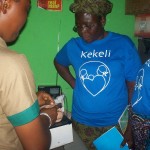As the Kekeli women continue their work in their communities, we are continually looking for ways to support them and improve their training.
During our visit last December, we conducted focus groups with the women and people in their villages. It became apparent that improving the teaching and training regarding family planning was a large need (I use the word family planning instead of contraception because I think it implies empowerment through choice, by allowing women to safely space their pregnancies and to not have more children then they can care for). There were misconceptions regarding how many family planning methods work and expected side effects. Perhaps more importantly than the technical aspects of family planning, we were able to better understand other factors that prevent use, specifically the stigma that women face. It is very culturally important for women to produce large families and using anything that could potentially inhibit this is often not accepted by men or women. It is also seen as an attempt at adultery when women seek contraception methods and many women felt they had to be very secretive when desiring to access family planning. It was through these candid conversations that we began exploring moving the Kekeli women towards focusing on family planning in the coming year.
This goal of ours, it turns out, lines up well with an international movement to again focus on family planning. The Bill and Melinda Gates Foundation has set aside a large amount of their funding to focus on family planning. There was recently a summit in London to address family planning, and many large donors made commitments to support family planning efforts in the coming years.
Our own project is looking for ways to improve the education of the Kekeli women regarding family planning, as well as to connect with what the government in Ghana is already doing to address the need. One of the most exciting aspects of this project is that we are looking to hire two of the Kekeli women to lead the initiative, further developing the leadership and skills that we know they possess. As a provider of women’s health and someone who is passionate about reproductive health justice, this new project is near and dear to my heart. We are hoping to role out the initiative this Fall so keep your eyes peeled!
-Olivia
Links:




